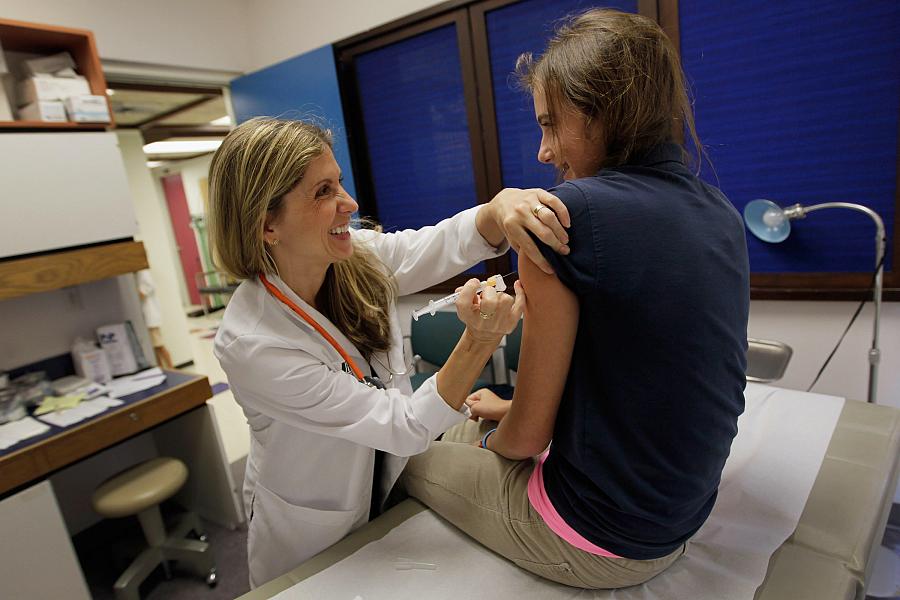What we’re missing in today’s politicized debate over vaccines

Joe Raedle/Getty Images
This month has indeed been a “bruiser in the vaccine wars,” as Ryan White noted in a recent piece for the Center for Health Journalism. First, in an online column, a Cleveland Clinic physician, Dr. Daniel Neides, made unsubstantiated suggestions about a link between vaccine ingredients and neurologic diseases. Then, news broke that President elect Trump might nominate Robert F. Kennedy Jr., who has previously expressed dubious and scientifically unfounded opinions about certain vaccines, to lead a proposed new vaccine safety commission.
The critiques of the Cleveland Clinic physician and the potential Trump nominee have been fast and furious. Cleveland Clinic vocally disavowed the column written by Dr. Neides, and promised he would be “disciplined.” Likewise, numerous media organizations and vaccine experts have written withering critiques of Kennedy’s past statements.
While we do not condone the unsubstantiated statements made by Dr. Neides and Kennedy, we also think it is important that those with scientifically based concerns about vaccine recommendations feel comfortable expressing their views. We fear that, in the current political environment, there is a risk that legitimate concerns about vaccinations may become conflated with more fringe viewpoints.
One important concern that Dr. Neides did raise in his column, and which we share, is that there has been a somewhat alarming explosion in vaccination recommendations in recent years. There are now 15 separate vaccines recommended for healthy children before their 18th birthday, which represents more than twice the number recommended in 1983. Many of these vaccines — including measles, mumps, rubella, polio, pneumococcus, and Haemophilus influenza — are extremely important, and have led to dramatic improvements in public health.
"We fear that, in the current political environment, there is a risk that legitimate concerns about vaccinations may become conflated with more fringe viewpoints."
But not all recommended vaccines are slam dunks. For example, is it really necessary to administer the hepatitis B vaccination to neonates, at a time when their risk for acquiring the disease is low? Likewise, the benefits of the currently approved shingles vaccine for older adults are modest, and it would be understandable why a patient might opt to decline this injection, particularly considering the cost. Moreover, there are legitimate safety concerns with some vaccines. A few years ago, for example, an older version of the rotavirus vaccine was removed from the market due to safety concerns.
There are also common-sense reasons for worrying about the recent increase in vaccine recommendations. First, like any new recommendation, it creates work and uses clinical time that providers might otherwise spend addressing other issues. We and several other experts recently raised this point when new guidelines were issued recommending an additional pneumococcal vaccine among older adults (note that we support use of this vaccine in young children). These new recommendations may increase the burden of vaccination among already overworked primary care practices, even though there is little high-quality evidence that the new vaccine adds substantial value. Yet as we add more and more vaccinations to the checklist, we necessarily take away focus from other important topics that providers ought to cover.
We also worry that the success and safety of some vaccinations should not automatically imply the efficacy and safety of all vaccinations. This nuance has been lost in the current dialogue. In her thoughtful book on the history of vaccination, “On Immunity,” the poet and critic Eula Biss writes about the complicated historical relationship between forced vaccination and communities that hold deep mistrust for the medical profession. Her thesis is not that recommendations to vaccinate are overly paternalistic; rather, she invites some empathy for those who hold skeptical views. Biss writes: “Even a modestly informed woman squinting at the rough outlines of a compressed history of medicine can discern that quite a bit of what has passed for science in the past two hundred years … has not been the product of scientific inquiry so much as it has been the refuse of science repurposed to support already existing ideologies.”
Overall, we strongly believe public health experts are well-intentioned, and most of the standard vaccine recommendations should be followed. Indeed, individuals who opt not to accept certain key childhood vaccines — such as measles, mumps, rubella, polio, pneumococcus, and Haemophilus influenza — not only put their children at risk but also risk the health of their communities. When raising skeptical viewpoints about vaccines, we need to be cautious to avoid fueling scientifically baseless concerns about vaccine safety.
Nevertheless, because vaccine safety has become so politicized, we also need to be vigilant to ensure that patients, scientists and doctors feel comfortable raising legitimate concerns about vaccine safety. Just like any medical intervention, we need to demand high-quality scientific evidence about vaccine safety and efficacy, and we should continue to question the dramatic recent increase in vaccine recommendations. We should not accept on blind faith that all of these vaccines are necessary.

**
Related post:

